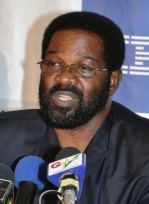
Alfred Vanderpuije, Mayor of Accra, Ghana
By Alfred Vanderpuije, Mayor of Accra, Ghana / Source: IBM
As Mayor of Accra and Chief Executive of the Accra Metropolitan Assembly, I would say that there are few areas as crucial for infrastructure investment as cities.
At the top of my agenda is Accra and the transformation of its existing systems and services for the benefit of its citizens and businesses. The truth is we cannot look to Accra’s future opportunities, without looking into the challenges of today.
Accra’s existing infrastructure is being put under increasing strain by an influx of new residents – the city’s population has expanded by over 1 million people – a 35 percent increase in the past decade alone. As we cannot, and will not, put a wall around the city to restrict the arrival of new residents, we can expect this trend to continue.
We must therefore act today to ensure that the city’s systems – from transportation, to water, sanitation, energy, healthcare, public safety, education and administration – are able to accommodate and cope with this influx of new residents.
For instance, today nearly all transportation in Accra is by road, but 70 percent of the vehicles carry only 30 percent of the people – a trend which causes significant traffic jams during peak hours.
Accra also suffers from perennial flooding problems and in 2011 there was extensive loss of life due to flash floods within the city. These problems highlight the extensive modernization required to our sanitation and storm water systems.
At the heart of many of these problems is our inability to finance projects to maintain and transform Accra. The reality is, my Metropolitan Assembly struggles to raise enough revenue for city services due to out-of-date revenue collection systems, tax evasion and fraud.
The government of Ghana and the Accra Metropolitan Assembly, supported by international institutions, such as Cities Alliance, are already taking steps to address these challenges. Recently, Ghana’s President, John Dramani Mahama, launched the National Urban Policy Framework and Action Plan to promote the sustainable development of Ghanaian cities and towns. In Accra, we have put in place the Millennium Cities Initiative to raise the standard of living and we are beginning the transformation of many of the city’s systems. The Accra Sanitary Sewer and Storm Water Drainage Alleviation Project, supported by the U.S. government, also stands to improve waste water treatment for the city’s four million residents.
We recognize we cannot do this work alone. We need to tap into expertise and experience from across public and private sectors and civil society, within Ghana and around the world. We also recognize that the infrastructure we are currently installing has to be designed to withstand the challenges of tomorrow. We must therefore turn to the latest technologies to ensure that our systems are optimized and smarter.
IBM recently offered its expertise to the Accra Metropolitan Assembly to help tackle some of the city’s most intractable problems. A team of IBM experts travelled to Accra last year to work alongside our own. Just last week the company presented me with a report which outlines some of the key challenges and possible solutions in areas such as transportation, city services and energy. I also met with Dr. Kamal Bhattacharya, Director of IBM Research-Africa who presented some interesting new solutions specially designed for Africa.
We see great opportunity for technology in Accra. For example, in the area of revenue collection, we see potential to use mobile payment systems to enable citizens and small businesses to pay for their taxes and city services electronically. Once payment systems are digitized, it will become a lot easier for my administration to identify cases of tax underpayment or fraud.
In the area of transportation, we could also turn to mobile phone data to help us to understand how Accra’s residents move around the city and how we could use that data to enhance our transportation systems to avoid traffic bottlenecks and traffic jams. We have a number of mobile service providers active in Ghana who could act as partners for such work.
In the area of water and sanitation, we could use technology to help monitor and manage our drainage systems and predict possible cases of flooding.
Technology holds great potential in Accra. However, we also recognize that what makes a city safer and smarter are its people. We need to forge a better relationship with our citizens and increase their sense of responsibility for their city. Accra’s residents need to take an interest in caring for the city. Nearly every one of our residents has a mobile phone – this creates the perfect channel for reporting problems and threats to the city’s infrastructure.
Across Africa, cities are growing quickly – economically and demographically. In Accra we need to embrace technologies and show leadership to ensure that our city is not left behind.
Eight minute video on Accra's Smarter Cities activities: http://www.youtube.com/watch?










